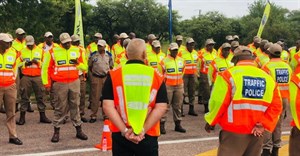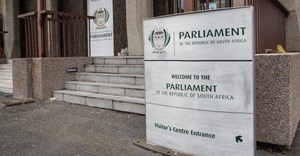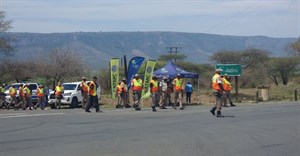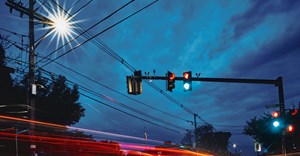The cost of road carnage
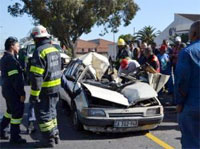
The Automobile Association of SA (AA) estimates it cost the country R158bn in 2011, after damage and medical expenses, future payments by the Road Accident Fund (RAF) and income loss are tallied up. It is a cost SA can ill afford. It equals the price tag for Eskom's new Kusile power station, its costliest ever, and is not far off the R180bn budgeted for state spending on basic education in 2012/13.
Transport minister Ben Martins puts the annual cost of vehicle accidents at a far higher R306bn.
At either of the above estimates, the cost of vehicle accidents is many times what it would be if SA's road accident rate were in line with global norms. This is evident from the World Health Organisation's 2009 global status report on road safety.
In the study SA fared abysmally, with 33,2 road deaths per 100,000 people ranking it 159th worst. The global average was 20,8 deaths per 100000 and very low rates were achieved by countries such as Sweden (5,2), the UK (5,4), Germany (6), France (7,5) and Australia (7,8). In road deaths - almost 14,000 per year - SA ranked ninth highest.
Every year almost one in 10 of SA's 10,5m vehicles is involved in an accident. This places a strain on insurers.
"Vehicle accidents are threatening the sustainability and affordability of motor insurance," says Dawie Buys, the SA Insurance Association's motor segment manager.
The soaring cost of spares is the insurers' biggest problem. "Ten years ago spares were 30% of claims costs and crime 70%. Today spares represent 70% of costs and crime 30%," says Buys. Spares, he says, will have cost insurers about R16bn in 2012, up from R13bn three years earlier.
To control spiralling costs, Buys says, insurers are pursuing an alternative spare parts project aimed at replacing original equipment manufacturers' parts with equally good but cheaper alternatives. If the initiative fails, Buys warns that insurance will become increasingly expensive and the already low figure of one-third of vehicles insured will fall further.
Repairing or replacing a vehicle damaged in an accident is one aspect of SA's shocking road safety record. The other is repairing human damage and replacing lost income.
"Many people naively believe the RAF will cover them," says Ronald Bobroff, president of the SA Association of Personal Injury Lawyers (APIJ). In reality, RAF cover can prove hopelessly inadequate, he says.
The fuel levy-funded RAF, Bobroff says, replaced compulsory third party insurance in the late 1980s. "The RAF in its original form was a good scheme, assuring victims of appropriate compensation."
This situation changed radically for the worse when amendments to the RAF Act came into force in 1998, he says.
"Victims are deprived of appropriate compensation," says Bobroff. "You can no longer sue a wrongdoer under your common law rights, and compensation for future loss of income is capped."
Compensation for permanent income loss is capped at about R200,000 a year and adjusted in line with inflation. "For a person earning, say, R1m, the consequences could be financially devastating," says Bobroff.
The amendments also severely limit a victim's right to claim from the RAF for pain and suffering. Bobroff estimates 92% of victims are excluded. "You have to be half-dead," he says. "That's why RAF claims are down from 100,000 to less than 50,000 [a year]."
Things are set to get worse under the proposed replacement for the RAF, the Road Accident Benefit Scheme (Rabs), Bobroff warns. Under the RAF, he says, a driver who was the sole cause of an accident cannot claim compensation. This restriction will fall away under Rabs.
"Resources are finite," says Bobroff. "Unless huge resources are pumped in, it will mean there is even less for victims." Technically insolvent, the RAF ended its year to March 2012 with a net deficit of R46,4bn. This was despite the RAF fuel levy having risen from 31,5c/l in 2005 to 88c/l at present.
It gets worse. Under Rabs proposals, Bobroff says, there will be no pain and suffering compensation at all and all benefits, including income replacement, will end at age 65. "If you have no other income, you will be at the mercy of the state pension system," he says.
Another big blow under Rabs will be the abolition of compensation for private medical care. The right to private medical tariffs was won in a constitutional court application in 2011 led by the APIJ backed by the SA Law Society and AA.
The implications of a private medical tariff ban are significant. According to Discovery Insure, in its year to June 2012 the average cost to its medical scheme of members involved in vehicle accidents but not hospitalised was R53,000. Where hospitalisation was required, this rose to R80,000.
Bobroff proposes a possible solution: "Allow people to buy top-up RAF insurance. It could be done when buying your annual car licence." His solution was put to the RAF board and though it was received positively, it went no further, he says.
But the ultimate solution would be to reduce SA's road accident rate significantly. Buys and AA public affairs head Gary Ronald believe the solution lies in education from school level, changing road-user attitudes and far stricter enforcement.
A study by the CSIR reveals that 95% of accidents result from one or more traffic offences being committed.
Source: Financial Mail via I-Net Bridge
Source: I-Net Bridge

For more than two decades, I-Net Bridge has been one of South Africa’s preferred electronic providers of innovative solutions, data of the highest calibre, reliable platforms and excellent supporting systems. Our products include workstations, web applications and data feeds packaged with in-depth news and powerful analytical tools empowering clients to make meaningful decisions.
We pride ourselves on our wide variety of in-house skills, encompassing multiple platforms and applications. These skills enable us to not only function as a first class facility, but also design, implement and support all our client needs at a level that confirms I-Net Bridge a leader in its field.
Go to: http://www.inet.co.za



